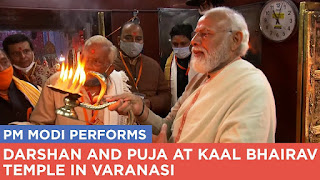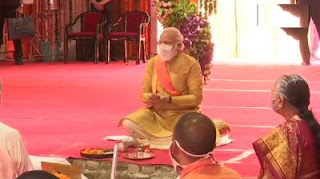Prime Minister Modi
inaugurated the first phase of the Kashi Vishwanath corridor in Varanasi
recently. A whopping Rs 900 crore was spent on the corridor which connects the
classical temple with the Ganga river. The project is expected to promote
religious tourism.
I have never
been able to come to terms with the view of Modi and his party that religion
should play a major role in the running of a nation. My view, for whatever it
is worth, is that religion should have nothing to do with politics. Religion is
a matter of the soul and it should remain there: with the individual souls.
There can be temples and other places that may help people to stay in touch
with their souls. But what is a Prime Minister of a country doing in a temple doing
what a pujari should be doing?
For centuries
now, eminent thinkers have questioned the validity of religion particularly in public
life. Too many philosophers and writers have told us in no uncertain terms that
a thinking person could be happy and moral without God or gods even in personal
lives. But at the same time many of them – right from Cicero – also worried
about what the average person would do and feel without religion.
If you have
the ability to think clearly and properly, you won’t need religion. That’s what
most of these great thinkers say. But some clear thinkers have accepted
religion for the sake of going with the herd. If I am not mistaken, it was Dag Hammarskjold
who said that it was “loyalty to the tribe” that took him to church on Sundays.
Hammarskjold would not need religion for being ‘good’. He had an excellent
brain to tell him why it was his duty to be ‘good.’ But for those who lacked
such brains, he recommended religions which, in his words, should be “the
guardians of the deepest beliefs and the loftiest dreams of man.” In simple
words, religions should give human values and ideals and aspirations to people.
Values,
ideals and aspirations. Not Kashi Viswanath corridors. Not statues of gods. Not
temples and pilgrimage centres. Not the least, religious tourism.
In a country
like India which is sliding rapidly down on all indices that matter – economy,
GDP, public health and hygiene, education, employment, security – religious tourism
is like a palliative drug given to people who are looking for basic things like
food and shelter. What do shanti mantras mean for a starving man?
PS. This post
is provoked by Indispire Edition 400: Should religious tourism be
promoted anymore? #ReligiousTourism


Hari OM
ReplyDelete'My view, for whatever it is worth, is that religion should have nothing to do with politics. Religion is a matter of the soul and it should remain there: with the individual souls.'
Hear! Hear! Absolutely everyone is equal to their own choice - but to press that choice upon others, particularly at national level, goes beyond the bounds... YAM xx
But the nation is pressing its views on me and a lot many others!
DeleteReminded me of what Khushwant SIngh had written... Religion like sex should be practiced in one's privacy.
ReplyDeleteThat's nice 😊
DeleteTourism is nothing but business and religious tourism is nothing but using religion for business. As far as the Indian premier is concerned, his business is power-linked politics only and he is (and has been) using religion for this business (of his) only. Mankind does not need any religion at all. Still people can practice religions as per their choice and faith but nobody should impose it on others or allow it to interfere with the mundane affairs. Common public interest should unarguably be separate from religion(s). Humanitarian values are above all religions, religious beliefs, religious books, religious symbols and religious persons (of real or imaginary nature).
ReplyDeleteYeah, religious tourism sounds like an oxymoron. It should be pilgrimage. But then we have a leader for whom even gods are meant to be monetized.
DeleteAgreed with your thoughts on this blog!! There is a tourism and there is a business and i loved to see both as a different perspectives and never wanna combine these what political parties now a days doing.
ReplyDeleteHow to Get Free Diamonds in Free Fire